Maximizing the Lifespan of Your Hot Water Heater: Knowing Its Durability
In the quest to ensure the effective performance and longevity of your hot water heater, it’s crucial to understand its lifespan, recognize signs of wear, and adopt maintenance practices. This article delves into the durability of tankless water heaters, examining factors that influence their lifespan, signs indicating the need for attention, and strategies to maximize their operational years. By being proactive in the care of your water heater, you can avoid untimely breakdowns and replacements, and enjoy a continuous supply of hot water in your home.
Key Takeaways
- Tankless water heaters, with proper maintenance, can last 15-20 years, influenced by water quality, usage patterns, and heating installation quality.
- Recognize the need for replacement when you encounter inconsistent hot water, increased energy costs, frequent repairs, or water leaks.
- Regular maintenance is pivotal for extending the lifespan of your water heater, which includes flushing the system, monitoring water quality, and ensuring proper ventilation.
- Proactive measures such as addressing issues promptly, sizing the system correctly, and scheduling professional inspections are essential for water heater longevity.
- Understanding the average lifespan and factors affecting the durability of tankless water heaters is crucial for homeowners to optimize performance and avoid unexpected expenditures.
Understanding the Lifespan of Your Hot Water Heater
The lifespan of a hot water heater typically ranges between 8 to 12 years, influenced by factors such as maintenance, water quality, and model. Knowing this timeframe helps homeowners plan for replacements and understand the importance of regular check-ups to ensure optimal performance.
Lifespan of Different Types of Water Heaters
The durability of a hot water heater is greatly influenced by its type. Tankless water heaters are known for their longevity, often reaching up to 20 years of service. This is due to their on-demand heating, which minimizes wear and tear. In contrast, storage tank heaters typically last between 10 to 15 years, as they work continuously to keep water at a set temperature.
Several factors contribute to the lifespan of these heaters:
- Quality of the unit
- Maintenance routine
- Local water hardness
- Usage patterns
For tankless units, high usage can lead to more frequent maintenance needs, while lower demand can extend their life. Regular maintenance is crucial for both types to achieve their maximum potential lifespan.
Factors Influencing Your Water Heater’s Longevity
The average lifespan of a hot water heater can vary widely, influenced by several key factors:
- Quality of installation plays a critical role in ensuring the unit operates as intended.
- Usage patterns, such as the frequency and volume of hot water used, directly affect the heater’s wear and tear.
- The type of water heater, whether tankless or with a tank, comes with different longevity expectations.
- Water quality, particularly the hardness, can lead to sediment build-up and corrosion, impacting the heater’s efficiency and lifespan.
Proper placement of your water heater is also essential. A unit installed in a cool, dry environment is likely to outlast one in a more harsh setting. Adhering to the manufacturer’s recommended settings, like temperature limits, can also extend the life of your water heater. By understanding and proactively managing these factors, you can significantly enhance the durability and performance of your water heater.
Average Lifespan: Tank vs. Tankless Water Heaters
Tankless water heaters are known for their longevity, often outlasting their tank counterparts. A well-maintained tankless unit can last between 15 to 20 years, a significant increase over the average tank water heater lifespan.
Factors that influence the lifespan of tankless water heaters include:
- Water quality
- Usage patterns
- Installation quality
- Regular maintenance
To ensure the longest possible life for your tankless water heater, it’s crucial to address issues promptly, monitor water quality, and adhere to a consistent maintenance schedule. While tank water heaters are susceptible to corrosion and rust, tankless models avoid these issues by not storing water, which contributes to their extended lifespan.
Recognizing the Signs Your Water Heater Needs Attention
Signs that your water heater needs attention include inconsistent water temperatures, strange noises, leaks, or discolored water. These symptoms suggest it might be time for maintenance or repair, helping to prevent more significant issues down the line.
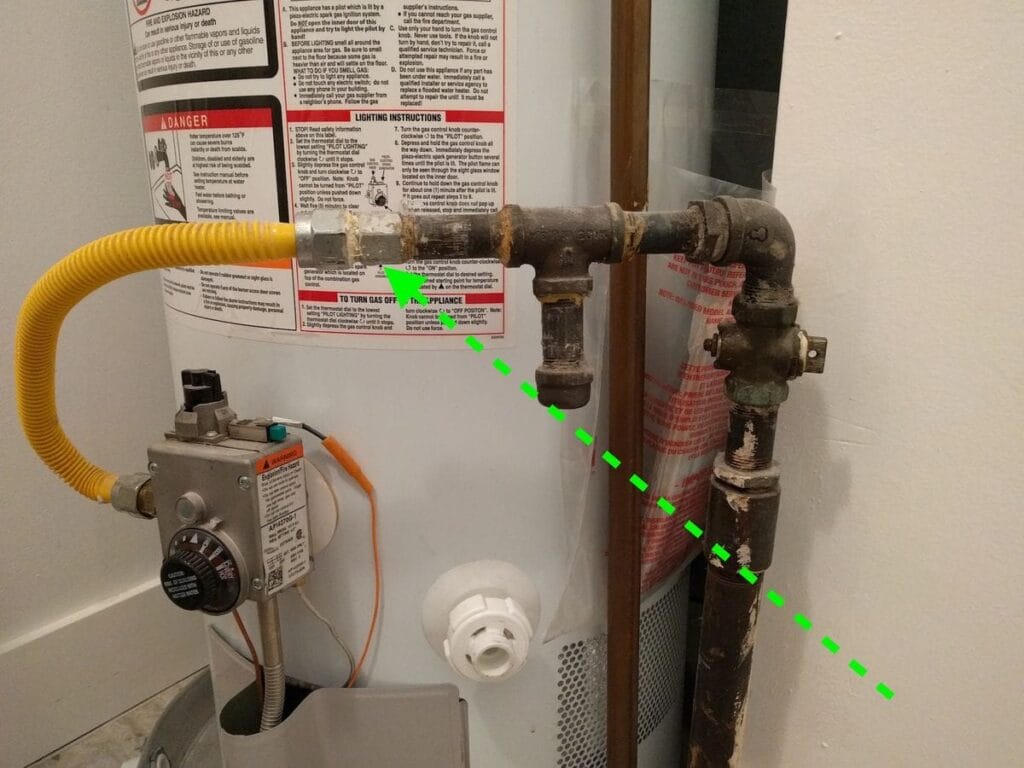
Common Signs Your Water Heater May Need Replacement
When your water heater may need to be replaced, certain symptoms can alert you. Age is a primary factor; if your unit is over 6-10 years old, it’s likely reaching the end of its service life. Here are some common signs:
- Inconsistent water temperatures or a complete lack of hot water
- Frequent heating repairs, yet the water heater continues to underperform
- Visible signs of corrosion or leakage around the tank
- Unusual noises such as rumbling or banging from the tank
- A significant increase in utility bills, suggesting inefficiency
If you encounter these issues, it’s crucial to consult a professional. They can provide a comprehensive evaluation and determine if your water heater needs attention or replacement.
Understanding Water Heater Maintenance Needs
Regular maintenance is the cornerstone of a water heater’s performance and longevity. It’s advisable to perform regular maintenance annually. This check-up includes inspecting the unit, flushing the tank, cleaning key components, and checking for signs of wear and tear.
To maintain your water heater effectively, follow these steps:
- Flush the tank to remove sediment and debris.
- Inspect for leaks or corrosion, which can indicate more serious issues.
- Check the heating elements to ensure they are functioning correctly.
By addressing repairs promptly and adhering to a maintenance schedule, you can prevent costly replacements and ensure a reliable supply of hot water. It is also advised to get a heat pump service on time.
When to Consider Water Heater Repair and Replacement
Deciding between repairing or replacing your water heater hinges on several factors. If you’re facing inconsistent hot water, increased energy bills, or frequent repairs, it might signal the need for a new unit. Here are some points to consider:
- Discolored Water: Rusty water suggests it’s time to replace your water heater.
- Cost of Repairs: When repair costs approach or exceed the price of a new water heater, replacement is often more economical.
- Age of the Unit: An old water heater nearing its expected lifespan may warrant an upgrade to a more efficient model.
Consult a professional plumber or specialist to assess your water heater’s condition. They can provide a thorough inspection and guide you on the best course of action. Remember to request a detailed cost breakdown before any service to avoid surprises and ensure the technician’s expertise aligns with your water heater type. You can also read our full guide on how much does a water heater cost.
Maximizing the Life of Your Hot Water Heater
To maximize the lifespan of your hot water heater, regular maintenance is crucial. This includes annual inspections, flushing the tank to remove sediment, checking the anode rod, and ensuring the temperature setting is appropriate. These steps can significantly extend the life of your unit.
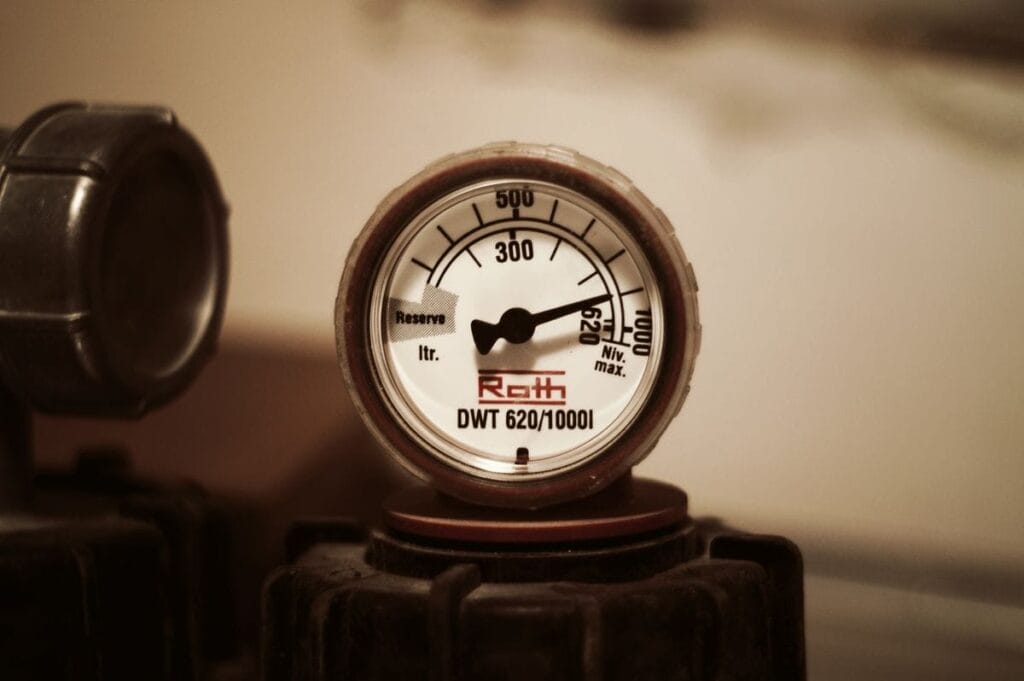
Tips for Extending Your Water Heater’s Life
Regular maintenance is crucial for extending the life of your water heater. Ensure you perform periodic checks and timely repairs to maintain efficiency.
- Flush the tank annually to prevent sediment buildup, which can impair the heater’s function and efficiency.
- Set the temperature to 120 degrees Fahrenheit to avoid overheating and save energy.
- Insulate the water heater and pipes to minimize heat loss and reduce energy bills.
Always engage a certified professional for repairs to avoid improper fixes that could shorten the heater’s lifespan. By adhering to these practices, you can enjoy a reliable hot water supply for years to come.
Importance of Regular Water Heater Maintenance
Regular maintenance is the cornerstone of a reliable and efficient water heater. It’s not just about preventing breakdowns; it’s about optimizing performance. Flushing the tank, inspecting for leaks, and checking the heating elements are all part of a routine that keeps your system in top shape.
Key benefits of regular maintenance include:
- Early detection of potential issues
- Prevention of sediment and mineral buildup
- Assurance of safety and efficiency
- Extension of the unit’s lifespan
By staying on top of these tasks, you not only ensure that your water heater operates at peak efficiency but also save on energy costs. Remember, a well-maintained water heater is less likely to surprise you with sudden malfunctions or failures.
Upgrading Your Water Heater for Better Longevity
Upgrading your hot water heater can be a strategic move to ensure better longevity and performance. Consider an upgrade if your current unit is over a decade old, as modern water heaters come with advanced features that can significantly enhance energy efficiency and provide more consistent hot water.
- Improved energy efficiency leads to lower utility bills.
- Advanced features, such as smart controls, offer better temperature regulation.
- Newer models may have longer lifespans and warranties, suggesting greater durability.
Investing in a high-quality hot water heater from a reputable manufacturer not only offers better performance but also contributes to the overall energy management of your home. Remember, while the initial cost may be higher, the long-term savings and reliability can be well worth the investment.
Deciding When to Replace Your Water Heater
Deciding to replace your water heater involves considering its age, the frequency of repairs, efficiency, and changes in household needs. When repair costs add up, or the unit no longer meets your hot water demands, it might be time for an upgrade.
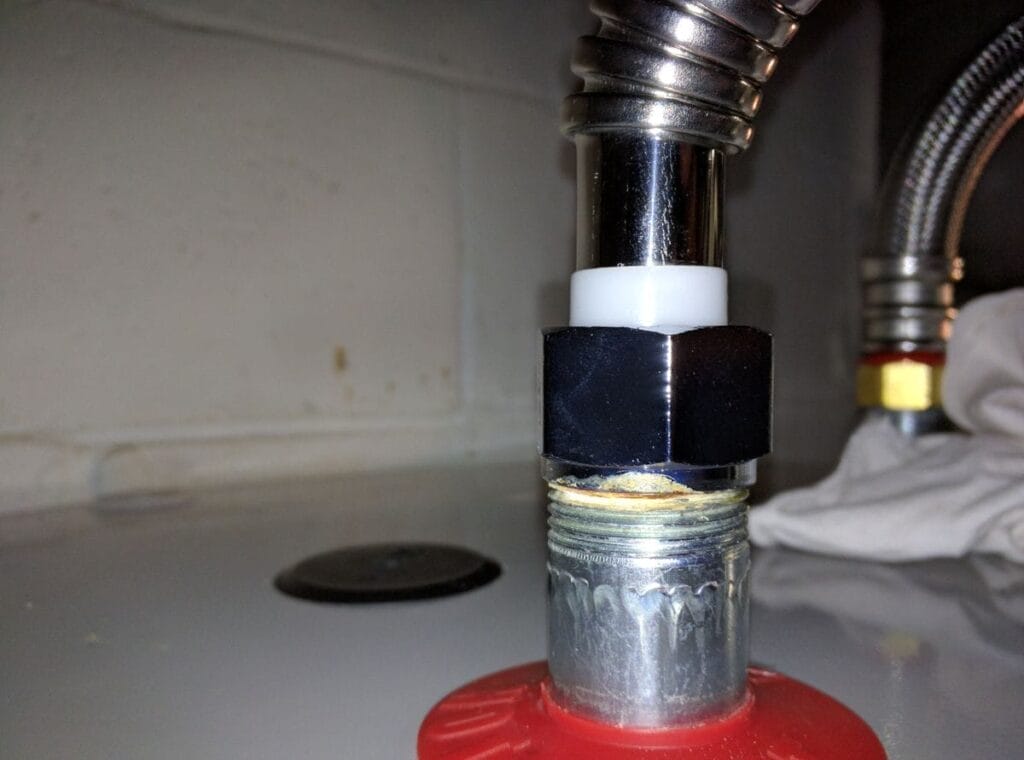
Knowing When to Replace Your Hot Water Heater
Recognizing when to replace your hot water heater is crucial for maintaining a consistent supply of hot water and avoiding unexpected breakdowns. If you experience inconsistent hot water, increased energy bills, frequent repairs, or notice leaks, it’s time to consider a replacement.
Consult with a professional if you observe these signs:
- Inconsistent hot water temperature
- Rising energy costs
- Frequent need for repairs
- Visible leaks or damage
A professional plumber or water heater specialist can provide a thorough inspection and determine if a replacement is necessary. Replacing an outdated or failing unit with a new, energy-efficient model can lead to better performance and lower energy bills, ultimately offering peace of mind.
Assessing the Condition of Your Water Heater Tank
Regular assessment of your water heater tank is essential for ensuring its longevity and performance. Inspect the bottom of the tank for any signs of leakage or corrosion, as these can be early indicators of a failing system. The water quality in your area can significantly affect the tank’s condition; hard water may lead to more sediment buildup and faster deterioration.
- Check for any signs of rust or corrosion around the tank.
- Look for water pooling at the bottom of the tank, which could suggest a leak.
- Examine the anode rod and replace it if it’s heavily corroded to protect the tank from rust.
By staying vigilant and addressing these issues promptly, you can help extend the life of your water heater.
Questions to Ask Before Replacing Your Water Heater
Before you decide to replace your water heater, it’s crucial to consider several key questions. Is the current unit beyond repair? Assess if the issues with your water heater are fixable or if a new unit is necessary. Next, evaluate the costs involved. Ask for a detailed breakdown of the replacement expenses to avoid surprises.
Consider the age and performance of your existing water heater. If it’s over a decade old or showing signs of significant wear, such as inconsistent heating or leaks, it may be time to replace a water heater. Also, think about energy efficiency. A new model could offer better energy savings and modern features that enhance your home’s energy management.
Lastly, ensure that any technician you hire is qualified to replace your water heater. Their expertise can lead to a more efficient installation and operation. By carefully considering these points, you can make an informed decision on whether to repair or replace your water heater.
Exploring Water Heater Options for Replacement
When exploring replacement options, consider energy-efficient models, tankless water heaters, or those powered by alternative energies like solar. Each option offers different benefits regarding efficiency, space savings, and environmental impact, suiting various household needs and preferences.
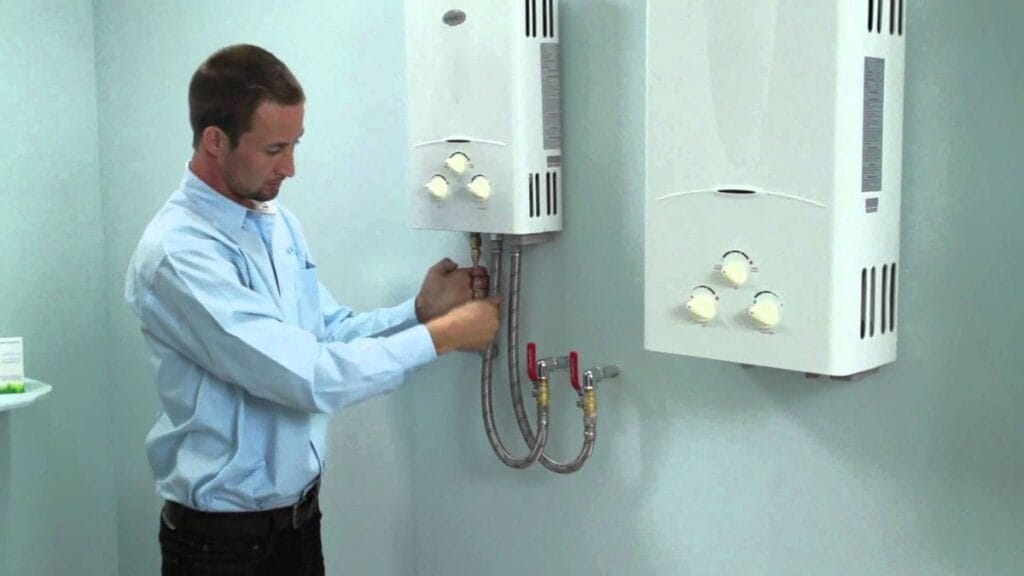
Comparing Tank vs. Tankless Water Heaters
When choosing between a traditional water tank heater and a tankless water heater, consider several key differences. Tankless water heaters are known for their energy efficiency, heating water on demand and thereby reducing energy waste. This contrasts with water tank heaters, which maintain a constant supply of hot water, leading to potential standby heat loss.
- Tankless heaters provide continuous hot water and require less space.
- Water tank heaters have a lower initial cost but may lead to higher utility bills over time.
- The lifespan of tankless heaters is generally longer, offering better long-term savings.
Understanding these distinctions can guide you to a decision that aligns with your household needs and preferences.
Benefits of Upgrading to a New Water Heater
Upgrading to a new water heater can significantly enhance your ability to efficiently heat water. Newer models often come with advanced features, such as smart controls, which provide better temperature regulation and convenience. Additionally, a new electric water heater is likely to be more energy-efficient, reducing the amount of electric water heating costs over time.
- Improved energy efficiency means less energy is wasted to heat the same amount of cold water.
- Advanced features offer greater control over water temperature and usage.
- Potential for a longer lifespan and better performance compared to older models.
It’s important to consider the long-term savings on utility bills when evaluating the upfront cost of a new electric water heater. While the initial investment may be higher, the overall savings and improved performance can justify the expense. Remember, a reliable source of hot water is not just a comfort but a necessity for daily living.
Choosing the Right Type of Water Heater for Your Home
Selecting the ideal water heater for your home involves balancing several factors. Consider the size of your household and hot water needs to determine the appropriate capacity. A smaller water heater may suffice for fewer occupants, while larger families might require a higher capacity unit.
Evaluate the different types of water heaters available, such as tank, tankless, solar, and hybrid models. Each type offers distinct advantages in terms of energy efficiency and space requirements. For instance, tankless water heaters provide hot water on demand and save space, whereas solar water heaters can offer significant energy savings over time.
Lastly, think about the long-term operating costs and not just the initial price. Energy-efficient models may have a higher upfront cost but can lead to savings on utility bills. It’s crucial to weigh these expenses against your budget and environmental preferences to make an informed decision.
Water Heater Life Expectancy and Replacement Process
The life expectancy of a water heater is generally 8-12 years but can be extended with proper care. The replacement process involves selecting a new heater that fits your home’s needs, safely removing the old unit, and ensuring the new installation complies with local codes and standards for optimal performance.
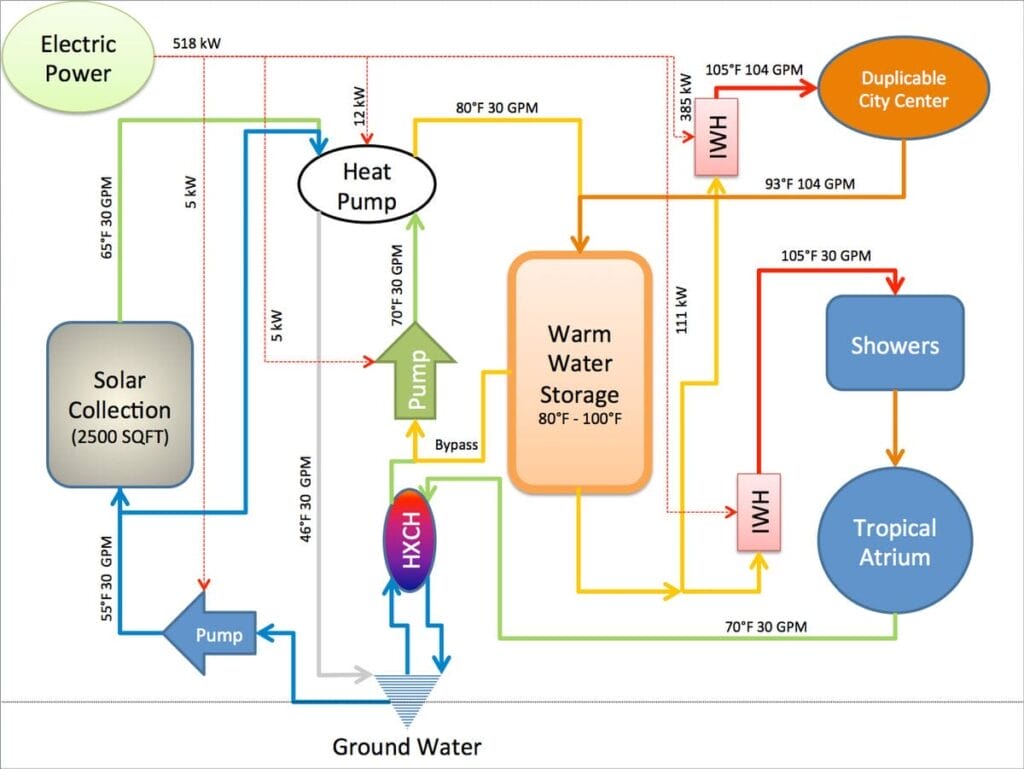
Understanding Water Heater Life Expectancy
The lifespan of a water heater is influenced by multiple factors. Key elements include the type of water heater, maintenance frequency, and water quality. Generally, tankless water heaters boast a longer lifespan, often ranging from 15 to 20 years with diligent care.
- Regular maintenance is crucial for longevity.
- Water quality, such as hardness, can affect the heater’s life.
- Usage patterns and installation quality also play significant roles.
It’s essential to monitor these factors and address any issues promptly to ensure your water heater operates efficiently for as long as possible. Remember, even with meticulous care, most traditional water heaters have an expected lifespan of 8 to 12 years. Beyond this period, it’s wise to start considering replacement options.
Steps to Replace Your Hot Water Heater
When you need to replace your hot water heater, the process should be approached with care and precision. Here are the steps to ensure a smooth replacement:
- Identify the need for replacement by observing signs of wear or inefficiency in your current unit.
- Choose a qualified technician with the right certifications and a track record of positive customer reviews.
- Request a detailed cost breakdown before any work begins to avoid surprises.
- Consider the benefits of upgrading to a more energy-efficient model for better performance and savings.
Always consult with a professional to assess the condition of your tankless water heater and to receive expert advice on the best course of action.
How Long Do Water Heaters Last: Real-world Expectations
When considering how long a water heater last, it’s essential to look at real-world expectations rather than just manufacturer estimates. On average, a well-maintained gas water heater can last for about 10-15 years. However, with proper care, some gas water heaters can even last up to 20 years or more. Tankless water heaters, known for their longevity, typically offer a lifespan of 15-20 years if maintained correctly.
Factors that contribute to the lifespan of a water heater include:
- Water quality
- Usage patterns
- Installation quality
- Regular maintenance
It’s important to note that these are general guidelines and actual lifespans can vary based on individual circumstances. For instance, some tankless water heaters may surpass the 20-year mark with diligent maintenance and use within their recommended capacity. Recognizing the signs of wear, such as inconsistent hot water or increased energy costs, is crucial for timely replacement and can prevent the inconvenience of sudden failure.
Conclusion
In summary, the durability and performance of your hot water heater are contingent upon a variety of factors, including the type of heater, installation quality, usage habits, and adherence to regular maintenance protocols. Tankless water heaters, known for their longevity, can serve effectively for 15-20 years when properly maintained. It is crucial to recognize the signs of wear and the need for potential replacement to prevent disruptions in service. By implementing the insights and strategies discussed throughout this article, homeowners can optimize the lifespan of their water heaters, ensuring a reliable supply of hot water while minimizing the need for premature replacements and costly repairs.
Q: How long does a water heater typically last?
A: A typical tank water heater can last anywhere from 8 to 12 years depending on various factors like usage, maintenance, and water quality.
Q: What are some signs that your hot water tank needs to be replaced?
A: Some common signs that your water heater needs to be replaced include leaks around the tank, inconsistent water temperature, strange noises coming from the tank, or rusty water coming out of the taps.
Q: How do I know when it’s time to replace a water heater?
A: It may be time to replace your water heater if it is more than 10 years old, if you are experiencing frequent breakdowns, or if your energy bills have been increasing due to an inefficient water heater.
Q: How much does it cost to replace a water heater?
A: The cost to replace a water heater can vary depending on the type of water heater you choose and the complexity of the installation, but it usually ranges from a few hundred to a few thousand dollars.
Q: How long can I expect a conventional tank water heater to last?
A: Conventional tank water heaters typically last between 8 to 12 years before they need to be replaced.
Q: What are some tips to extend a water heater’s lifespan?
A: To extend the life of your water heater, you can flush the tank regularly to remove sediment, insulate the pipes, and set the temperature to a moderate level to reduce wear and tear on the system.
Q: How long does a water heater installation usually take?
A: The time it takes to install a new water heater can vary depending on the type of water heater and the complexity of the installation, but it typically takes a few hours to a full day to complete.





